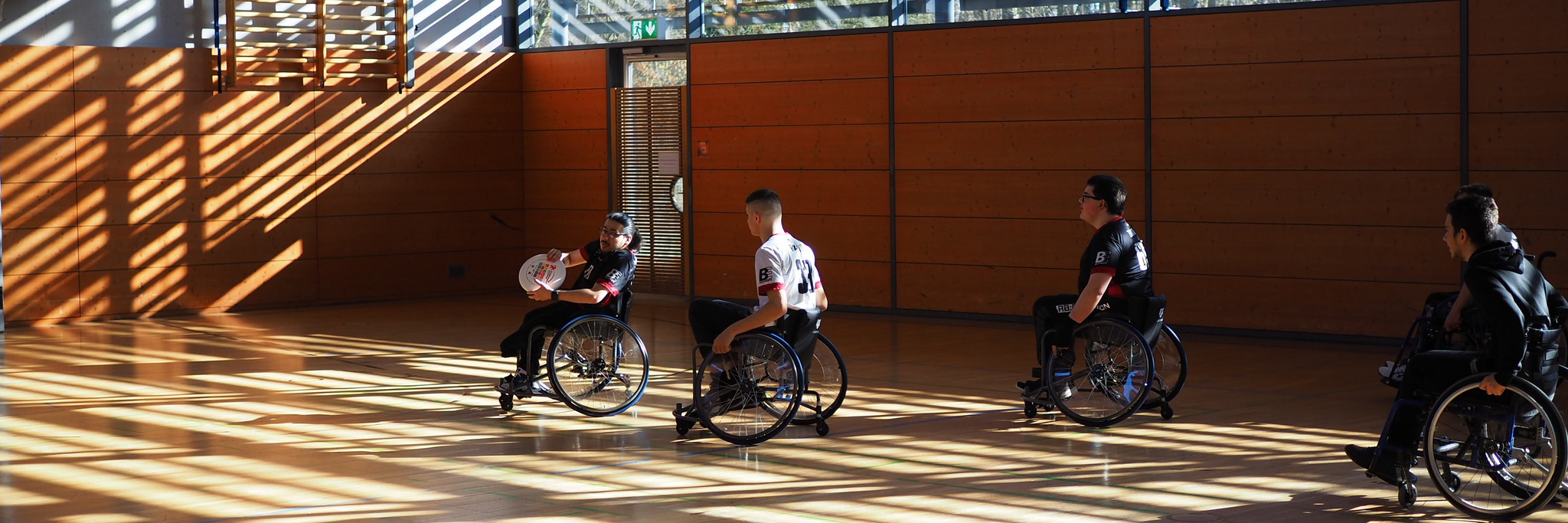Changing the Game: Germany’s Wheelchair Ultimate Team

When we last introduced the German Wheelchair Ultimate Team, they were preparing for their first World Championship. Since then, the squad has grown—welcoming new players, hitting milestones, and setting even bigger goals. Wheelchair Ultimate carries the spirit of the game—teamwork, fast-paced throws, and creativity—while opening the door to athletes of all abilities. It’s a powerful example of true inclusivity in sport.

A Brief History of Wheelchair Ultimate
The idea of Wheelchair Ultimate began to take shape in the early 2010s, with discussions first emerging during the 2013 WFDF Congress. The sport gained momentum in 2023, culminating in the inaugural World Wheelchair Ultimate Championship in Lignano Sabbiadoro, Italy, on September 29–30, 2023. Four teams competed, including Germany, Italy, and an international team primarily from Japan—a milestone moment for the sport.
Click here to learn more about the differences between the rules of the regular game of Ultimate and Wheelchair Ultimate.
From Bronze Medal to Bigger Goals
At that first World Championship, Germany made history by bringing home the bronze medal. What began as a small school-based project near Frankfurt has since grown into a thriving program at VSG Darmstadt, an inclusive sports club. The expansion has brought in new athletes, broadened training opportunities, and united players both with and without disabilities, aged 12 to 20.
Now 11 players strong—including two young women expected to join them at the next World Championship—the team’s weekly practices are about more than skill. They’re a space for laughter, connection, and support, where teammates push each other to grow both on and off the court.
Meet the Players
Each player adds something unique—skills, personality, and the spirit that defines Ultimate:
- Semih (No. 10, handler, 20 y.) – Team captain with outstanding vision and athleticism. Inventor of the “German Pass,” a quick upside-down throw that’s nearly unstoppable.
- Massi (No. 9, handler, 20 y.) – Calm, collected, and the perfect Spirit Captain. Known for his own signature throw.
- Tuncay (No. 33, cutter, 17 y.) – Lightning-fast in his chair, strong communicator, and football fan. Once famously ate a magic towel thinking it was candy.
- Simon (No. 7, cutter, 18 y.) – Another football fan and a tough defender, both in Ultimate and beyond.
- Phil (No. 8, cutter, 19 y.) – Fluent in English, passionate about geography, loyal Eintracht Frankfurt supporter, and master of dialect impressions.
- Emilio (No. 12, handler, 17 y.) – The team comedian, full of energy. Loves music, Mario Kart, and speaking English.
- Michael (No. 77, handler, 15 y.) – The youngest player. Drummer, scout, and always brimming with energy.
Together, they form not just a competitive squad but a family.
Strength in Diversity
Every athlete brings a different mix of abilities, making the team stronger together. Some draw from other sports like wheelchair basketball; others contribute creativity, leadership, or communication skills. Coaching requires flexibility—traditional instructions don’t always apply, so drills are adapted with visual cues, colors, and demonstrations. Each player has a clear role, helping them focus on their strengths.
As coach Tanja Gebert explains: “Everyone has ‘special abilities’ that drive the game and the team forward.”
Shining a Light on Non-Visible Disabilities
This year, the team is also raising awareness of non-visible disabilities—conditions like rheumatism, epilepsy, autism, visual impairments, muscular weakness, perception disorders, heart conditions, and cancer.
These challenges aren’t always obvious but can significantly impact daily life and sports participation. Unlike visible disabilities that fit into systems like the Paralympics, non-visible disabilities are often overlooked. For some athletes, running long distances isn’t possible; for others, perception disorders or autism make standard gameplay difficult. In wheelchair sports, those barriers fade. As Tanja explains, “Inclusion is more than just wheelchairs and ramps—it’s about recognizing the many disabilities that aren’t visible at first glance. We really need to integrate everybody.”

Many of the players grew up playing from a chair and, as Tanja notes, “everyone carries their own package.” Within this team, they’ve found comfort and acceptance in a space designed for them. The court levels the field, letting them focus on the game without the demands of traditional running play.
Tanja emphasizes: “Only by recognizing and respecting non-visible disabilities can we ensure that everyone has access to sport, that no one is left behind, and that we all work together for a diverse and inclusive community. Especially in the Frisbee world, we should stand up for this.”
Why the Sport Matters
For these athletes, Wheelchair Ultimate is more than a game—it builds confidence, belonging, and resilience. The teamwork they develop extends far beyond the court. Their story also underlines a larger truth: inclusion in sport matters. At a time when disability programs face funding cuts, this team shows what’s possible when athletes are given the chance to play and be seen.

More than a Team
Many of these athletes have known each other since childhood, their bond strengthened by shared challenges and experiences. Newcomers are welcomed with warmth, but the foundation of trust and support runs deep.
Practices are filled with laughter and encouragement. For most, the World Championship will also mark their first flight, making it as life-changing as it is competitive. Meeting adult athletes with disabilities at the last Worlds left a lasting impression, offering role models who showed that a full and joyful life is always possible.

Looking Ahead
This year, the team’s goals are clear: win a medal, keep improving, and above all—have fun. But beyond competition, their journey carries a much bigger message: inclusivity in sport matters. With disability programs under pressure, the German Wheelchair Ultimate Team proves what’s possible when athletes are given space, resources, and respect.
Show your support this year and tune in to the livestream! Fans can follow their journey at the upcoming World Wheelchair Ultimate Championship:
WWUC 2025 Website & Livestream
Wheelchair Ultimate Germany Instagram



